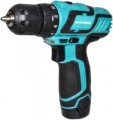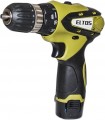Rotation speed
The speed of rotation of the working nozzle provided by the tool.
If a single number is indicated in this paragraph (for example, 1800), it can be either a standard, constant, or maximum rotation speed. This refers to the maximum speed if the tool has more than one speed (see "Number of speeds") and/or a speed controller (see "Functions"). In turn, two or three numbers through an oblique line (for example, 1100/2300/3400) are indicated only for models that have the corresponding number of individual speeds. Each of these numbers indicates the standard (and in the presence of a speed controller — the maximum) number of revolutions at one of the speeds.
Anyway, when choosing a tool by the number of revolutions, it is worth considering both its general type (see "Device") and the specifics of the intended work. Detailed recommendations on this matter are quite extensive, it makes no sense to give them in full here — it is better to turn to special sources. We note only a few general points. So,
high -speed drills nowadays are considered to be drills capable of delivering more than 3000 rpm. In general, high speed contributes to productivity, but there is also a downside: increasing the speed (for the same power) reduces torque — accordingly, the efficiency of working with stubborn materials and large diameter nozzles decreases. Therefore, it makes sense to specifically look for a "high-speed" tool only if speed is of key impor
...tance; it doesn’t hurt to make sure that the model you choose can provide the required efficiency and torque.Torque
Torque is the maximum force with which this model is capable of turning the working nozzle.
Higher torque gives more options, it allows you to cope with complex tasks such as drilling in hard materials, unscrewing stuck screws and nuts, etc. On the other hand, a lot of force requires corresponding power — and this, in turn, affects the dimensions , weight and cost of the tool itself, and also puts forward increased power requirements (mains power, battery capacity or pressure / compressor performance). And for some tasks, excessive torque is basically unacceptable, so for maximum versatility, it is desirable to have
torque control — and this affects the cost even more. And the more steps, the more optimally you can configure the tool to perform a particular type of work. So the general rule is this: when choosing, it is worth considering the specifics of the planned work, and not chasing the greatest working effort.
Detailed recommendations on choosing the optimal torque for different types of tools (see "Device") can be found in special sources. Here we note that it is of key importance primarily for screwdrivers, although it is also given for other types of tools. At the same time, in the “weakest” models, the maximum working force does not exceed 15 Nm, in the most powerful ones it is more than 150 Nm.
Charging time
The time to fully charge the battery that the tool is equipped with from a standard charger (when using other batteries or a “non-native” charger, this time may vary both in one direction and in the other).
For cordless tools in general, see "Power Source". And charging time data gives you an idea of how you'll need to organize your workflow and how long breaks you'll need to charge your batteries. The specific duration of the process will depend both on the capacity of the battery (ceteris paribus, a more capacious model takes longer to charge), and on the technologies used by the manufacturer that increase charging efficiency. However, in general, it is customary to refer to tools with
a good charging speed as models where this procedure takes no more than 45 minutes.
We also note that the specific meaning of this parameter also depends on the number of batteries in the kit. Recall that there are often several of them at once (see "Complete battery"), and while one battery is working, the rest can be charged. This allows you to reduce interruptions to a minimum, and even completely do without them. But if there is only one battery, charging breaks will inevitably be required in full. This is especially true for tools with a built-in power source (in models with replaceable batteries, the situation can be corrected by purchasing additional batteries).

